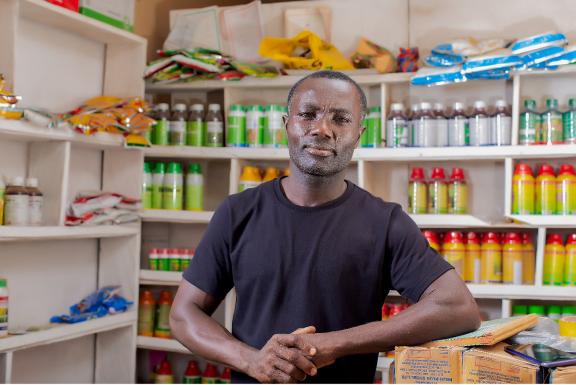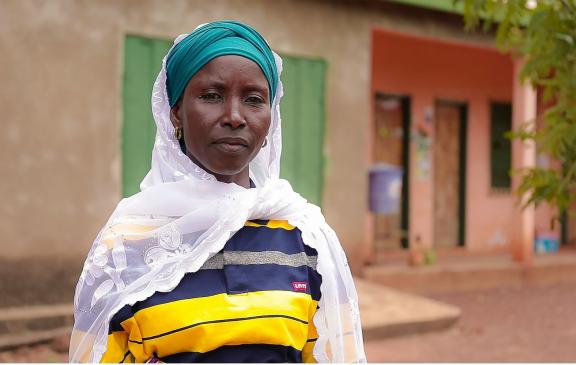The impact of climate change is impacting all sectors, with agriculture being particularly vulnerable, and a significant contributor to its exacerbation at the same time. The agricultural sector alone is indeed responsible for 19 per cent of greenhouse gas emissions, totalling 9.9 billion tons of CO2e annually.
Agriculture is a major industry in Ghana, Kenya, Nigeria, and Uganda, with up to 80 percent of farmland managed by smallholder farmers, who are highly vulnerable to the impacts of climate change, with wide-ranging supply chain impacts.
The Acumen Resilient Agriculture Fund (ARAF)—funded by the Green Climate Fund (GCF) and implemented by Acumen—is dedicated to improving climate resilience, ensuring long-term sustainable increases in agriculture productivity, and enhancing the incomes of smallholder farmers.
Farmerline, an investee company of ARAF, provides farmers in rural areas access to essential tools and resources including weather data, sustainable farming techniques, flexible financing and high-quality inputs including fertiliser.

Farmerline addresses the needs of farmers and delivers scalable smallholder engagement Graphic: Farmerline
Governments, development organisations, food manufacturers and agribusinesses in turn have access to traceable commodities, field mapping data, impact analytics and trends in the industry, enabling them to become more efficient and effective.
By focusing on these smallholder farmers as a profit-making business rather than subsistence farmers, Farmerline is helping to develop new markets and add commercial capital into the landscape, to complement the vital work done by philanthropic grants and aids.
Materials supplied by Farmerline. Edited by Zeenia Dastur, GCF.

Eric Acquah Sarfo, agro-input dealer in Ghana. Photo: Farmerline
“Farmerline supported me to scale my business. They have corrected my inefficiencies in my operations, given me inputs I didn’t have, and supported me with training on how to manage my daily records. They taught me how to use the Grow app, which has been of great support to my business.”
The impact of Farmerline's interventions extends beyond individual farmers to contribute to global food security and environmental conservation. In Ghana, GCF support contributes to a national Farmer Helpline that provides farmers with climate-smart information in local languages via a short code, with no internet required.
The helpline has both push and pull components - sending regular messages to over a million farmers in West Africa, containing up-to-date weather information, local market prices, sustainable farming practices and more. This helps smallholders adapt their practices, improving yield, sustainability, and profit.

Salima Zachari, an enterprising farmer from Gushegu in Ghana. Photo: Farmerline
On the pull side of the equation, about 100,000 farmers called the helpline and were able to ask questions to make informed decisions about crop selection, planting times, and weather-related risks. The helpline can also connect them with high-quality agro-inputs and market opportunities. Partnered farmers have reported increased crop yields, reduced vulnerability to climate-related risks and an overall improvement in their standard of living, as verified by 60 Decibels, an independent evaluator.
The service is active in Ghana and Cote d'Ivoire, with recent entries in Togo, Benin, and Burkina Faso. Looking ahead, Farmerline aims to work with governments, telco operators, NGOs, and development to roll out this “911 for Farmers” further across Africa and beyond. The languages supported by these helplines, many of which are critically endangered, can be used to train AI models which will both preserve them and ensure everyone can receive help in their own language.
Farmerline will also be adding new products to the helpline, to deepen education on financial literacy, introduce farmers to more eco-friendly farm products, and enrol farmers in carbon financing programmes. With governments, they also monitor nationally protected forest areas, with the hope of real-time responses to deforestation and mining.
Longer term and with more ambition, this technology can become transformative to government’s interaction with their citizenry. Using the push and pull of automated phone calls and feedback, governments can feel the pulse of the population, understanding their concerns and pain points, connecting it to real-time policy changes.
This approach could update the mechanisms of state administration that have not changed for generations. Initiatives like Farmerline’s “911 for Farmers” represent a significant step forward in empowering smallholder farmers to become more resilient and independent in the face of climate change, but the implications for the modern-day state and economy are wide-ranging and provocative.
Materials supplied by Farmerline. Edited by Zeenia Dastur, GCF.